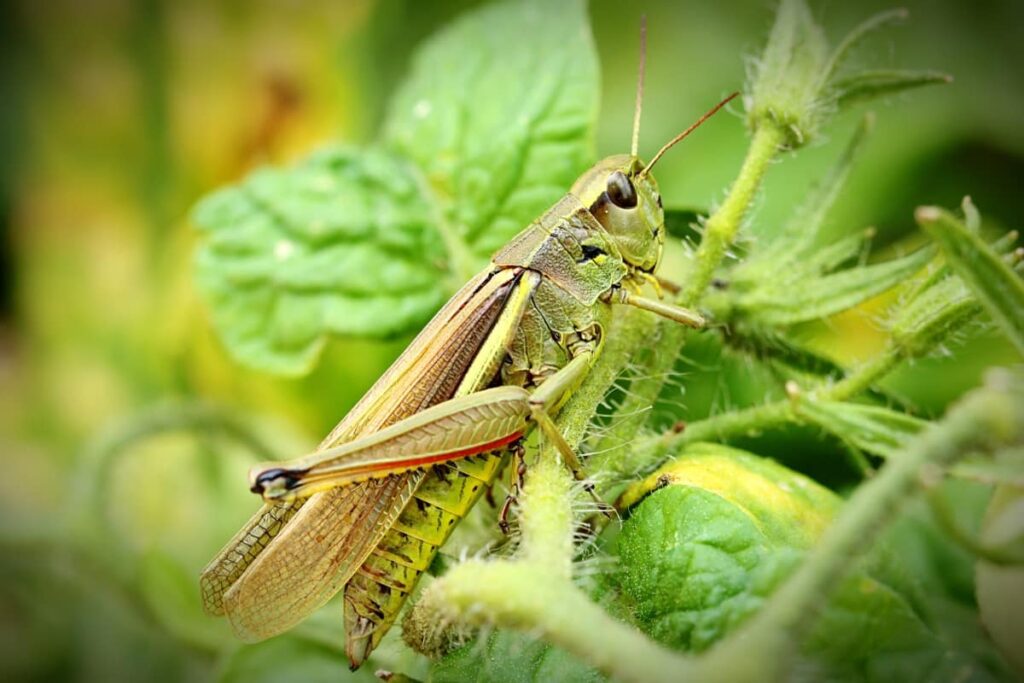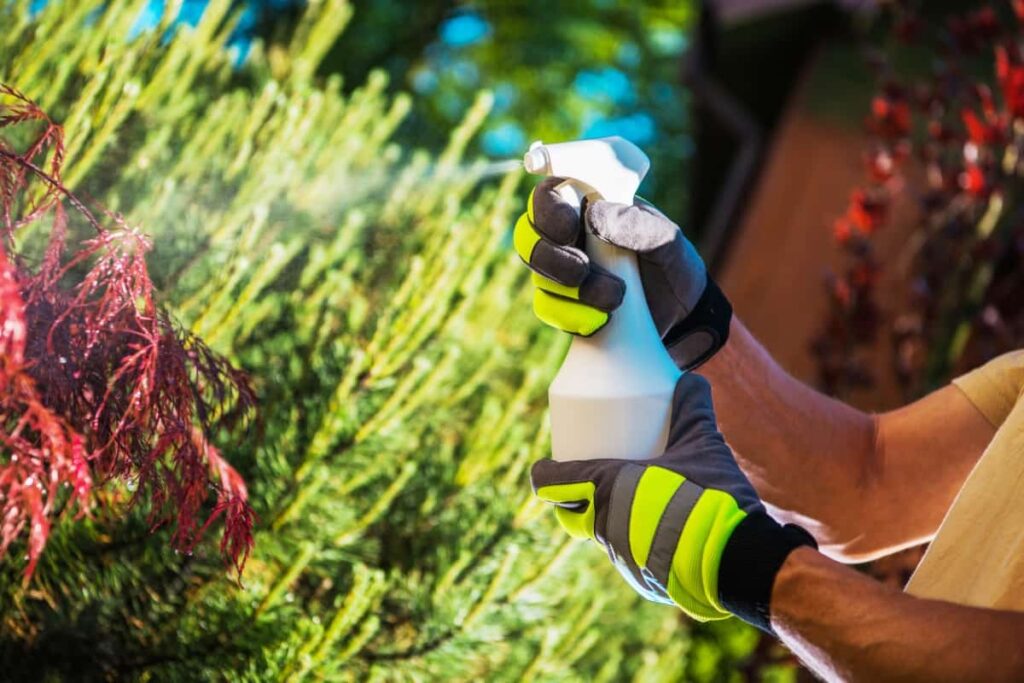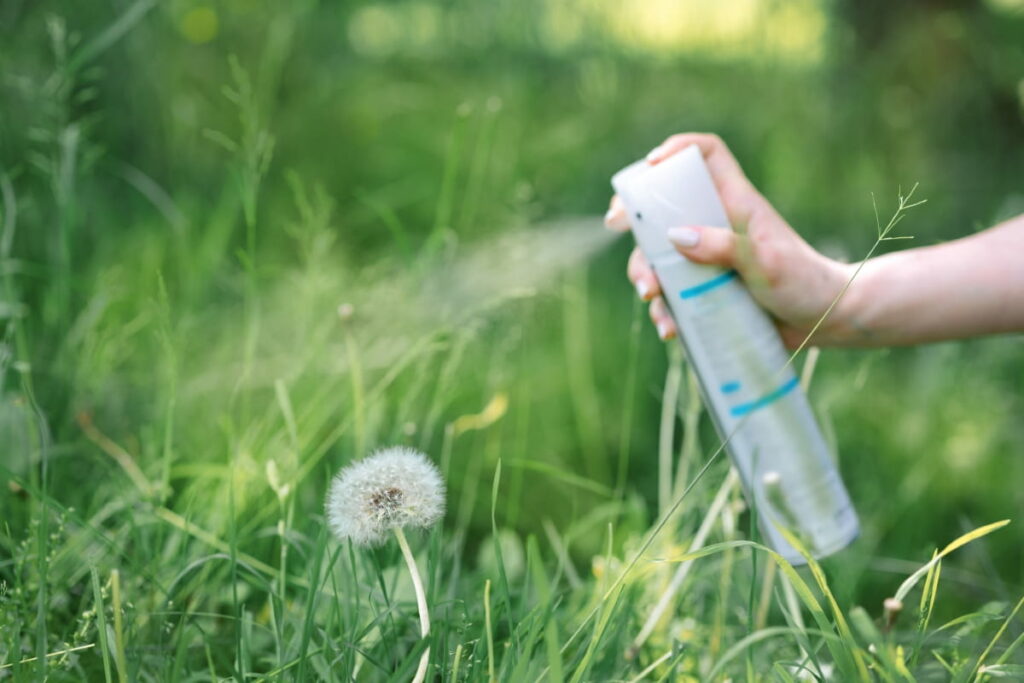Grasshoppers can wreak havoc on your garden, devouring plants and leaving destruction in their wake. Fortunately, there are easy and cost-effective homemade sprays that can help you get rid of these pesky insects. In this article, we’ll explore the top 10 DIY solutions to combat grasshoppers using readily available ingredients from your kitchen or garden. These environmentally friendly sprays will help protect your plants without resorting to harmful chemicals.

Top 10 Homemade Sprays for Grasshoppers
Neem Oil Spray
Neem oil, extracted from the neem tree seeds, is a powerful and natural homemade grasshopper repellent that can be effectively used as a spray to combat grasshopper infestations in your garden. The active compounds in neem oil, such as azadirachtin, disrupt the feeding and reproductive cycles of insects, making it an eco-friendly and safe alternative to chemical pesticides.
To create a neem oil spray, combine neem oil (1-2 tablespoons)with a few drops of dish soap liquid and a quart of warm water. The soap helps emulsify the oil and distribute it evenly on plant surfaces. Pour this neem oil into a spray bottle and shake well before application. Ensure thorough coverage of both sides of the leaves, stems, and other vulnerable parts of your plants.
Chilli Pepper Spray
Chilli pepper spray is a potent and DIY insecticide for grasshoppers from feasting on your garden plants. The active component in chilli peppers, capsaicin, is a powerful irritant for insects. When applied as a spray, it creates a barrier that repels grasshoppers without causing harm to your plants or the environment. To make this environmentally safe grasshopper spray, combine 2-3 tablespoons of crushed red pepper flakes or chopped fresh chilli peppers with a quart of water.
Boil the mixture and let it steep for about 24 hours. Strain the liquid to remove the pepper particles, then add some liquid dish soap drops to adhere to the plants. Pour the chilli pepper mixture into a spray bottle, and it’s ready for use. When sprayed on plants, the spicy nature of chili pepper spray deters grasshoppers from feeding.
Vinegar Solution
A vinegar solution serves as a simple yet effective homemade remedy to deter grasshoppers from damaging your garden. Vinegar, with its acidic properties, disrupts the feeding habits of these pests, making it an environmentally friendly alternative to chemical insecticides. To create a vinegar spray, mix equal parts of white vinegar and water. Add some liquid dish soap drops to help the solution adhere to plant surfaces.
Pour this organic grasshopper spray solution into a spray bottle and shake well before application. When sprayed on your garden plants, the acidity of the vinegar creates an unfavorable environment for grasshoppers, deterring them from feeding on leaves and stems. The soap aids in the distribution of the solution, ensuring comprehensive coverage on both sides of the foliage.
Essential Oil Blend
Crafting an essential oil blend can be a fragrant and effective solution to repel grasshoppers from your garden without resorting to harsh chemicals. Certain essential oils, such as peppermint, citronella, eucalyptus, and lavender, possess natural insect-repelling properties that can be harnessed to create home remedies for grasshopper spray.
In case you missed it: 7 Best Insecticides for Aphids on Plants: Sprays, Natural, Chemical, Organic, and Systemic Insecticides

To create your essential oil blend, mix 10-15 drops of each selected essential oil into a quart of water. Add a teaspoon of dish soap liquid to the mixture to enhance its adherence to plant surfaces. Pour all in a spray bottle and shake well before application. When sprayed onto garden plants, the aromatic blend acts as a deterrent for grasshoppers, disrupting their feeding and causing them to seek alternative locations. The pleasant fragrance also adds an aromatic element to the garden while serving as a natural grasshopper control.
Beer Trap
A Beer Trap is a simple and effective garden pest control DIY to control grasshoppers in your garden. To prepare this natural insecticide, begin by burying a shallow container, such as a saucer or plastic lid, at ground level. Fill the container with beer, as grasshoppers are attracted to its scent. The fermenting aroma lures them in, and once they enter the trap, they drown in the liquid. Place multiple traps strategically around the infested area, especially near vulnerable plants. Regularly replenish the beer to maintain its effectiveness.
Molasses Trap
A molasses trap is an organic and natural insecticide for garden pests to combat grasshopper infestations in your garden. Grasshoppers are attracted to the sweet scent of molasses, making it an enticing bait for trapping them. To create a molasses trap, mix one part of the molasses with nine parts of water, creating a concentrated solution. Pour the mixture into shallow containers, like lids or trays, and place them strategically around your garden. The sweet aroma of molasses lures grasshoppers, drawing them into the trap. Once inside, the sticky nature of the solution prevents their escape.
Salt Spray
While salt spray is effective against weeds, it’s important to note that using salt directly on plants as a pest control method, including against grasshoppers, can be detrimental. Salt is highly dehydrating, and its application can lead to desiccation and damage to plant tissues. Therefore, it is not recommended to use a salt spray directly on your garden plants to control grasshoppers.
However, you can employ salt indirectly by creating a barrier around your garden. Sprinkle a thin line of salt around the perimeter, creating an obstacle for grasshoppers. The idea is that the salt deters the pests from crossing the boundary and entering your garden.
Flour Dusting
Flour dusting is a simple and natural method that can help control grasshoppers in your garden. Flour disrupts the feeding habits of grasshoppers, leading to their avoidance of treated plants. This technique is non-toxic and an eco-friendly grasshopper solution to chemical pesticides.
In case you missed it: The 19 Best Garden Sprayers for Your Home Garden, Patio, and Lawn within your Budget

To apply flour dusting, lightly sprinkle all-purpose flour on the leaves and stems of your plants. The flour creates a fine layer on the plant surfaces, interfering with the grasshoppers’ ability to feed and causing them to avoid the treated areas. Make sure to cover both surfaces of the leaves for optimal effectiveness.
Herbal Tea Spray
Herbs such as mint, basil, and tansy possess natural insect-repelling properties that can be harnessed to create an effective, non-toxic grasshopper repellent. To make an herbal tea spray, steep some fresh, if not dried herbs in hot water for about 20-30 minutes. Strain the solution to separate any solid particles, and let it cool before transferring to a spray bottle.
For added potency, consider combining different insect-repelling herbs in your tea blend. Once prepared, generously spray the herbal tea solution on the leaves, stems, and surrounding soil of your plants. This creates a protective barrier that deters grasshoppers from feeding on your garden vegetation.
Pyrethrin-Based Spray
A pyrethrin-based spray is a natural and effective solution for DIY grasshopper prevention in your garden. Pyrethrins are natural insecticides extracted from chrysanthemum flowers, making them a botanical and eco-friendly alternative to synthetic pesticides. To create a pyrethrin-based grasshopper deterrents home recipe, you can purchase commercially available pyrethrin insecticides or make your own by steeping dried chrysanthemum flowers in hot water. Strain the mixture to extract the pyrethrins, and then dilute it according to the product instructions or your recipe.
In case you missed it: Top 10 Fertilizers for Treating Yellow Leaves in Indoor Plants

Conclusion
In conclusion, combating grasshopper infestations in your garden doesn’t require resorting to harsh chemicals. These top 10 garden insect repellent homemade sprays offer easy, natural solutions using common household ingredients. These DIY remedies are both eco-friendly and effective. Embrace these alternatives for a thriving garden, free from grasshopper damage, while promoting a healthier and more sustainable approach to pest control.
- Budget Friendly Sheep Shed Ideas: Cheap and Low-Cost Tips
- How Much Do Cattle Farmers Make: Revenue Streams in Cattle Farming
- Management Pests and Diseases in Your Cotton Field
- Sheep Farming Business Plan for Beginners
- Aquaponic Farming at Home: A Step-By-Step Guide
- Profitable Village Farming Business Ideas in 2024
- High-Yield Aquaculture: Fast-Growing Fish for Farming
- Effective Fish Pond Construction Techniques for Beginners
- Irrigation and Water Management in Pineapple Farming
